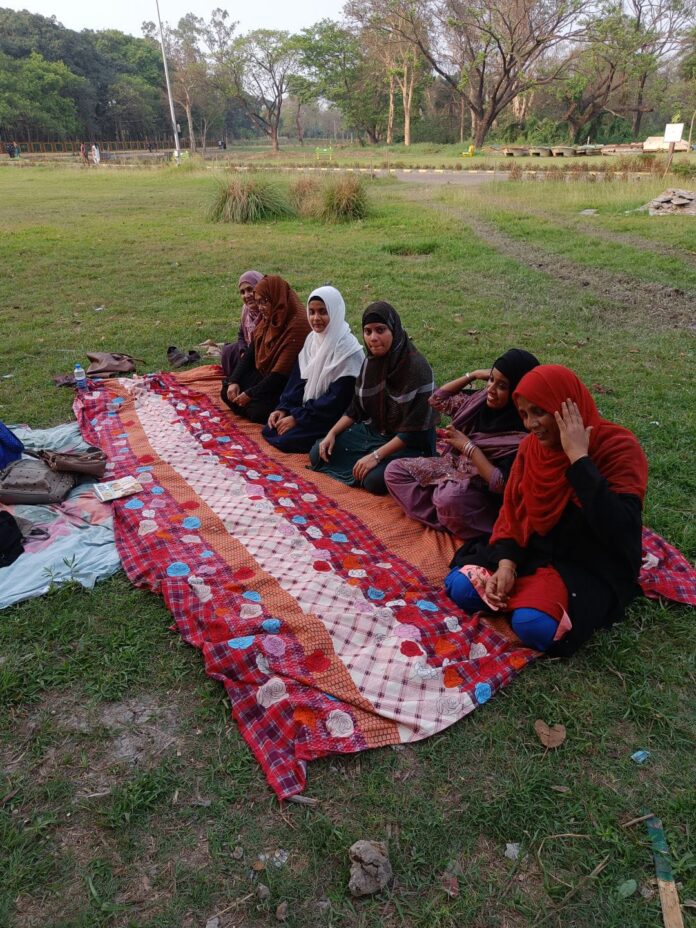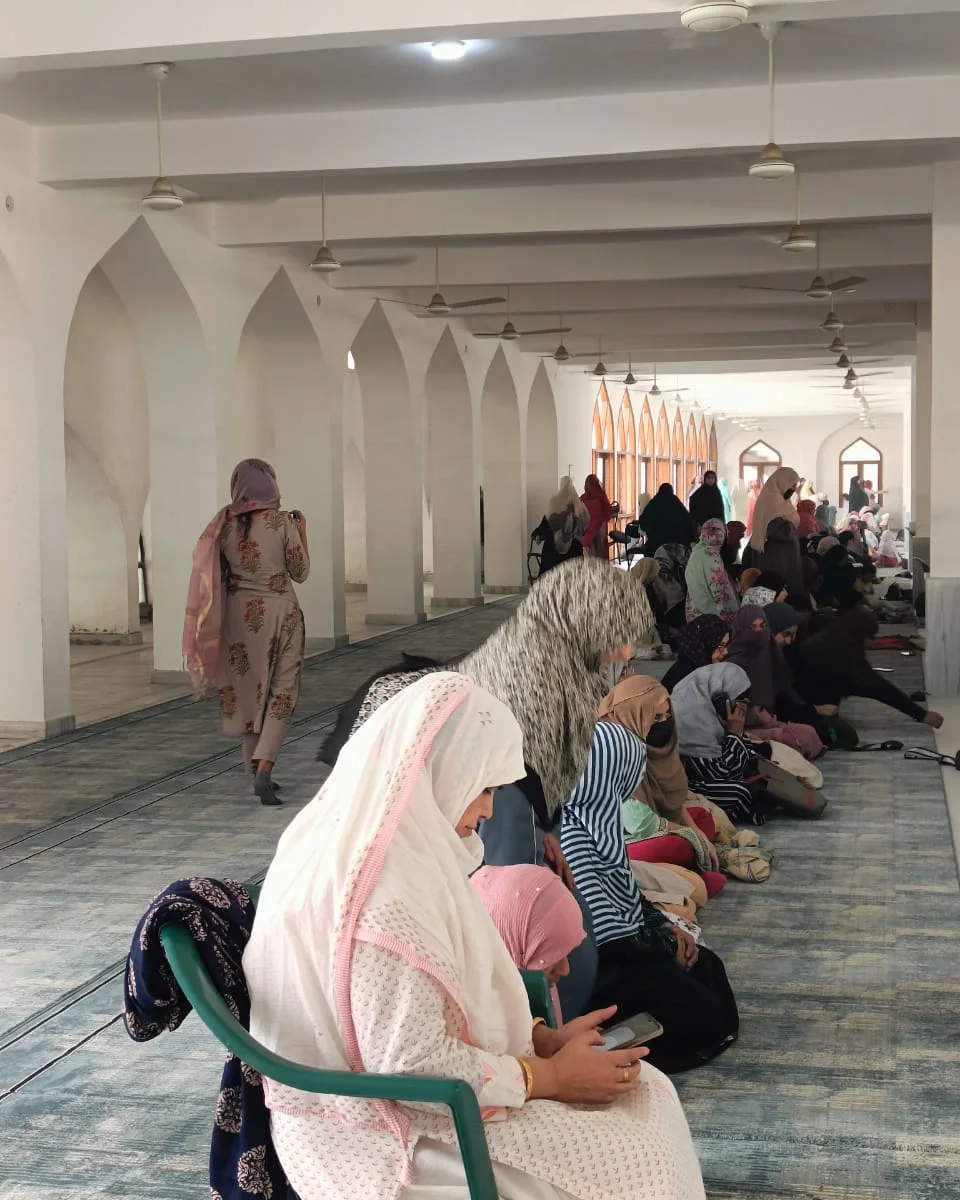Kolkata, WEST BENGAL:

A Kolkata-based collective Muslim Women Study Circle is working towards reclaiming the agency of Muslim women at a time when Islamophobia has been reared into the country’s social and political fabric.
New Delhi:
In April 2019, a collective of Muslim women predominantly belonging to Metiabruz, a suburb in Kolkata, came together to understand the Quran, Hadith, and contemporary news events. As the year progressed, the group actively participated in the protests against the contentious Citizenship Amendment Act. This prompted the realization of a need for a more extensive network of Muslim women from across India, which marked the beginning of the Muslim Women Study Circle (MWSC).
The formation of the MWSC comes at a time of unprecedented rise of islamophobia in India with Indian Muslim women, a regular target of the Hindu right wing. For instance, in 2021, Hindu right-wing men scraped the internet for pictures of prominent Indian Muslim women and uploaded them to an app called Sulli Deals, hosted on GitHub, listing them on “sale” with the intent to humiliate them. A year later they held a similar “auction” with pictures of Muslim women posted on another app called Bulli Bai. Same year, the high court in India’s Karnataka state ruled that the hijab is not “essential” to Islam. Amidst this, digital platforms such as Twitter, Facebook, WhatsApp, YouTube, and Reddit have accelerated the spread of anti-Muslim hate.
However, as COVID-19 spread in India, MWSC transitioned to the online platform, broadening its reach and significantly enhancing engagement. This transition facilitated the systematic recording, archiving, and dissemination of their sessions through various social media platforms.
MWSC operates as a porous organisation. Volunteers from across the country, including Islamic reverts participate in discussions that are conducted mainly in English, Urdu, and Hindi. Sessions with experts are conducted by the core team or MWSC Chat group, comprising around seven people. Beyond that, MWSC dedicates time to its Muslim Women Mental Health Support Group. These sessions provide a safe space to delve into issues pertinent to Muslim women, addressing challenges and solutions.
In day-to-day functioning, the organisation remains active on multiple fronts. WhatsApp chat groups buzz with conversations spanning the Muslim Women Book Club readings, subjects such as domestic violence, secularism, caste, creative writing politics, citizenship, legal rights, academic scholarships, etc., and the creation of materials for social media platforms.
“We explored ideas at the intersection of politics and spirituality, which were never previously discussed before, and were often overlooked in the context of Muslim women. Moving to an online platform helped us connect with other Muslim women specialising in different fields, such as academics, journalists, mental health professionals, religious scholars, etc. While sharing their knowledge, they also got to amplify their voices. Once we got that momentum, it just kept going,” said Sania Mariam, a MWSC founder and a research scholar of Political Science and Governance at IIT Bombay’s Monash Research Academy.
Bringing Muslim Women to Mosques

Despite the global historical prevalence of Muslim women praying in mosques, such spaces are noticeably lacking in India. MWSC’s ‘Muslim Women Masjid Project’, inspired by Al-Masjid-an-Nabawi (The Prophet’s Mosque), not only served as a palace of prayer for both men and women but also sheltered the homeless and the hungry.
The project started by making a catalog of existing women-friendly mosques. Along with open- discussions on “Women in masjids” online, MWSC started with Quranic dars on the importance of women in prayer spaces. They found that a huge number of women longed for offering namaz in Eidgah, instead of being at home waiting for the men to come back.
Aisha Masooma, a volunteer with MWSC from Guwahati said, “It is common to find women’s prayer areas confined to small rooms or basements of the mosques. When I was volunteering for the Assam chapter of this project, I was astonished to find women who had never been acquainted with the idea of visiting a mosque. So many Muslim women told me that the very idea of attending a mosque is an alien concept to them.”
Women the organisation visited different mosques to inquire about spaces for women to pray. “We made a list of such mosques and talked to the Imams. In Kolkata, for example, we had a one-on-one conversation with Imams, and they appreciated the ideas. Even if there was no separate place for women to pray, they allowed women to come, designating them an area in the mosque and promised to make a separate space for women in the future,” said Mariam.
A Petition Challenging the Hijab-Ban
In 2022, with the Hijab ban issue in Karnataka and court proceedings, MWSC recognized that among the arguments and counter-arguments by different parties, the most critical voice of the discourse was silenced, that of young Muslim women who chose to pursue their education as well as their faith.
They believed that the Hijab-row in Karnataka was essentially infantilising, and dismissing Muslim women, forcing them to choose between non-existing binaries such as education or hijab, Indianness or Muslimness, especially at a time when Muslim women are one of the lowest literacy rates in the country.
Therefore, in July 2022, MWSC challenged the Karnataka High Court’s decision to ban Hijabs in educational institutes in the Supreme Court. Prominent lawyer-activist Prashant Bhushan pro-bono represented the organisation.
While the petition challenged the idea that the two, Hijab and education are antagonistic in principle, it was also meant to create awareness that oppositional forces exist to the country’s increasing saffronisation. As a result, MWSC aimed to create an active role for Muslim women in the public sphere, and demand to creation of more such spaces. “There is a lot of skepticism related to Muslim women owning their agency from the existing political scenario. People always think, about who’s funding them, and which political arm they belong to. There is skepticism from within the community,” said Mariam.
She said that as Muslim women trying to create a forum like MWSC, they are often boxed into distinct categories such as secular Muslims, feminist Muslims, and religious Muslims. “It is difficult for them to imagine that there are Muslim women who want to be committed to their Deen [religion] while achieving a lot in this world,” she told Two Circles.
Backlash and Targeting From Hindu Right-Wing
In India, Muslims have been experiencing discrimination across various spheres, such as employment, education, housing, law, and justice among others. This pattern of discrimination has notably marginalised Muslim women, materialising in their isolation, for instance, a recent study revealed that Muslim women in India are half as likely to get callbacks for entry-level jobs as compared to Hindu women. Another study underscores the compounded disadvantage faced by Muslim women, positioning them as one of the least empowered segments of society. This disadvantage stems from their dual status as women and as members of the minority community in India.
During the Sulli deals incident, certain members of MWSC were subjected to an “online auction” due to their outspoken political views on social media. The organization has consistently encountered online trolling, with a notable example being a video addressing Hindu nationalism that attracted numerous offensive comments. The backlash has emanated from both inside and outside the Muslim community.
Ghazala Jamil, assistant professor at the Centre for the Study of Law and Governance, Jawaharlal Nehru University said, “Muslim Women’s organisations like the MWSC can be seen as a corner in the larger public sphere or a satellite public sphere, which can give Muslim women a chance to express their views without feeling they have to maintain silence about or hide their Muslim identity.”
Across the subcontinent, a dynamic wave of Muslim women’s rights networks is actively challenging essentialist perceptions of Muslim womanhood. Situated within the burgeoning Islamic feminist movement, these organisations articulate the multiple identities of Muslim women, cultivating a unique Islamic feminist consciousness as opposed to the idea of ‘universal sisterhood.’
“Instead of criticising these spaces as regressive or causing division, we should recognise them as opportunities for learning within the larger movement for gender equality. Organisations specifically for Muslim women provide a valuable place for them to express themselves without feeling overshadowed by dominant perspectives of Hindu or liberal feminists,” Jamil added.
The founders do not intend to convert the organisation into an NGO but rather see it as a diversified environment where Muslim women may freely express themselves and share their perspectives. “We just wanted to be a collective where women can come, speak, and put their views forward. They develop their agency, they get inspired. We aim to be better Muslims, better Muslim women, more confident Muslim women,” said Mariam.
Tasneem Khan is a student of History at Delhi’s St. Stephens College.
Nuzhat Khan is an independent reporter based in Delhi.
source: http://www.twocircles.net / TwoCircles.net / Home> Indian Muslim / by Tasneem Khan and Nuzhat Khan / January 11th, 2024








